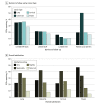Primary Care Practitioner Perceptions on the Follow-up of Abnormal Cancer Screening Test Results
- PMID: 36173627
- PMCID: PMC9523497
- DOI: 10.1001/jamanetworkopen.2022.34194
Primary Care Practitioner Perceptions on the Follow-up of Abnormal Cancer Screening Test Results
Abstract
Importance: Health care systems focus on delivering routine cancer screening to eligible individuals, yet little is known about the perceptions of primary care practitioners (PCPs) about barriers to timely follow-up of abnormal results.
Objective: To describe PCP perceptions about factors associated with the follow-up of abnormal breast, cervical, colorectal, and lung cancer screening test results.
Design, setting, and participants: Survey study of PCPs from 3 primary care practice networks in New England between February and October 2020, prior to participating in a randomized clinical trial to improve follow-up of abnormal cancer screening test results. Participants were physicians and advanced practice clinicians from participating practices.
Main outcomes and measures: Self-reported process, attitudes, knowledge, and satisfaction about the follow-up of abnormal cancer screening test results.
Results: Overall, 275 (56.7%) PCPs completed the survey (range by site, 34.9%-71.9%) with more female PCPs (61.8% [170 of 275]) and general internists (73.1% [201 of 275]); overall, 28,7% (79 of 275) were aged 40 to 49 years. Most PCPs felt responsible for managing abnormal cancer screening test results with the specific cancer type being the best factor (range, 63.6% [175 of 275] for breast to 81.1% [223 of 275] for lung; P < .001). The PCPs reported limited support for following up on overdue abnormal cancer screening test results. Standard processes such as automated reports, reminder letters, or outreach workers were infrequently reported. Major barriers to follow-up of abnormal cancer screening test results across all cancer types included limited electronic health record tools (range, 28.5% [75 of 263]-36.5%[96 of 263]), whereas 50% of PCPs felt that there were major social barriers to receiving care for abnormal cancer screening test results for colorectal cancer. Fewer than half reported being very satisfied with the process of managing abnormal cancer screening test results, with satisfaction being greatest for breast cancer (46.9% [127 of 271]) and lowest for cervical (21.8% [59 of 271]) and lung cancer (22.4% [60 of 268]).
Conclusions and relevance: In this survey study of PCPs, important deficiencies in systems for managing abnormal cancer screening test results were reported. These findings suggest a need for comprehensive organ-agnostic systems to promote timely follow-up of abnormal cancer screening results using a primary care-focused approach across the range of cancer screening tests.
Conflict of interest statement
Figures

References
-
- American Cancer Society . American Cancer Society Guidelines for the Early Detection of Cancer. March 14, 2022. Accessed August 24, 2022. https://www.cancer.org/healthy/find-cancer-early/cancer-screening-guidel...
Publication types
MeSH terms
Grants and funding
LinkOut - more resources
Full Text Sources
Medical

